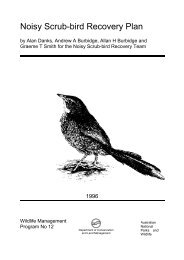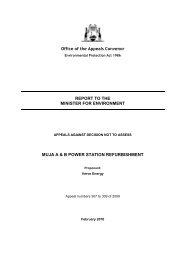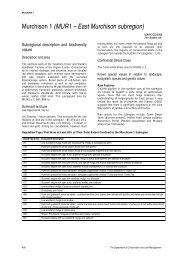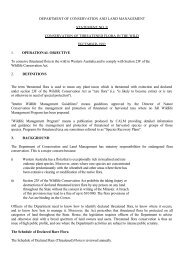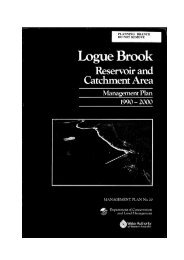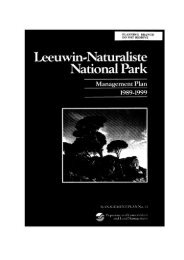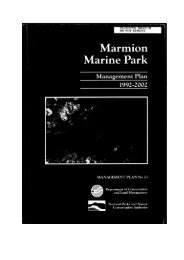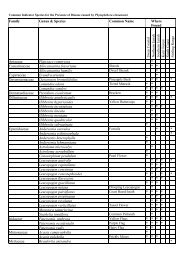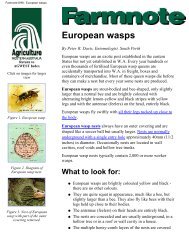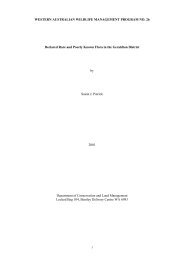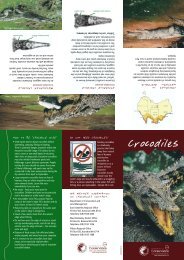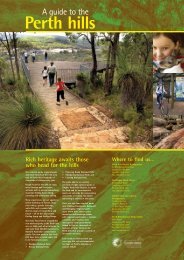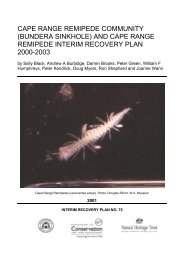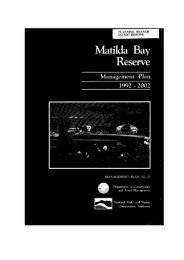Dryandra Woodland - Department of Environment and Conservation ...
Dryandra Woodland - Department of Environment and Conservation ...
Dryandra Woodland - Department of Environment and Conservation ...
Create successful ePaper yourself
Turn your PDF publications into a flip-book with our unique Google optimized e-Paper software.
COMMUNITY RELATIONS<br />
25. EDUCATION, INFORMATION AND INTERPRETATION<br />
BACKGROUND<br />
An effective education, information <strong>and</strong> interpretation program is an essential component <strong>of</strong><br />
management. It informs the public <strong>of</strong> the values, facilities, <strong>and</strong> recreational opportunities available<br />
<strong>and</strong> provides an avenue for greater underst<strong>and</strong>ing <strong>of</strong> the natural environment <strong>and</strong> its management.<br />
<strong>Dry<strong>and</strong>ra</strong> <strong>Woodl<strong>and</strong></strong>, with its conservation, recreation <strong>and</strong> production values, <strong>and</strong> agricultural setting,<br />
has a diversity <strong>of</strong> plants <strong>and</strong> animals (natural diversity), <strong>and</strong> l<strong>and</strong> uses. These factors, <strong>and</strong> recent<br />
growth in visitor numbers, have increased opportunities to promote the principle that the<br />
maintenance <strong>of</strong> natural biodiversity is essential to sustain each individual's quality <strong>of</strong> life-that is, if<br />
humans conserve <strong>and</strong> respect the richness, integrity, <strong>and</strong> stability <strong>of</strong> their biological <strong>and</strong> physical<br />
environment, ecosystems will remain healthy <strong>and</strong> sustain the activities <strong>of</strong> humans <strong>and</strong> other life<br />
forms. This basic tenet has been adopted as the theme for future education, interpretation <strong>and</strong><br />
information programs within <strong>Dry<strong>and</strong>ra</strong>.<br />
Relevant subjects for such programs include sustainable l<strong>and</strong> use, maintenance <strong>of</strong> biodiversity <strong>and</strong><br />
ecological processes, minimal impact recreation, <strong>and</strong> cultural heritage issues.<br />
ISSUES<br />
• The User Survey indicated a need to improve pre-visit <strong>and</strong> on-site interpretation by providing<br />
signs, maps, guides for activities, <strong>and</strong> information on the <strong>Dry<strong>and</strong>ra</strong> environment (CALM 1992c).<br />
• Information about <strong>Dry<strong>and</strong>ra</strong> needs to be integrated with that for other Wheatbelt areas, to avoid<br />
unnecessary repetition.<br />
OBJECTIVE<br />
• Develop the community's underst<strong>and</strong>ing <strong>of</strong>, <strong>and</strong> commitment to, the principle that biodiversity is<br />
essential to sustain each individual's quality <strong>of</strong> life.<br />
Community education, information <strong>and</strong> interpretation programs will aim to achieve the objective by<br />
developing awareness <strong>and</strong> underst<strong>and</strong>ing amongst the community, <strong>and</strong> providing the opportunity for<br />
individuals to experience <strong>and</strong> adopt compatible values.<br />
88



